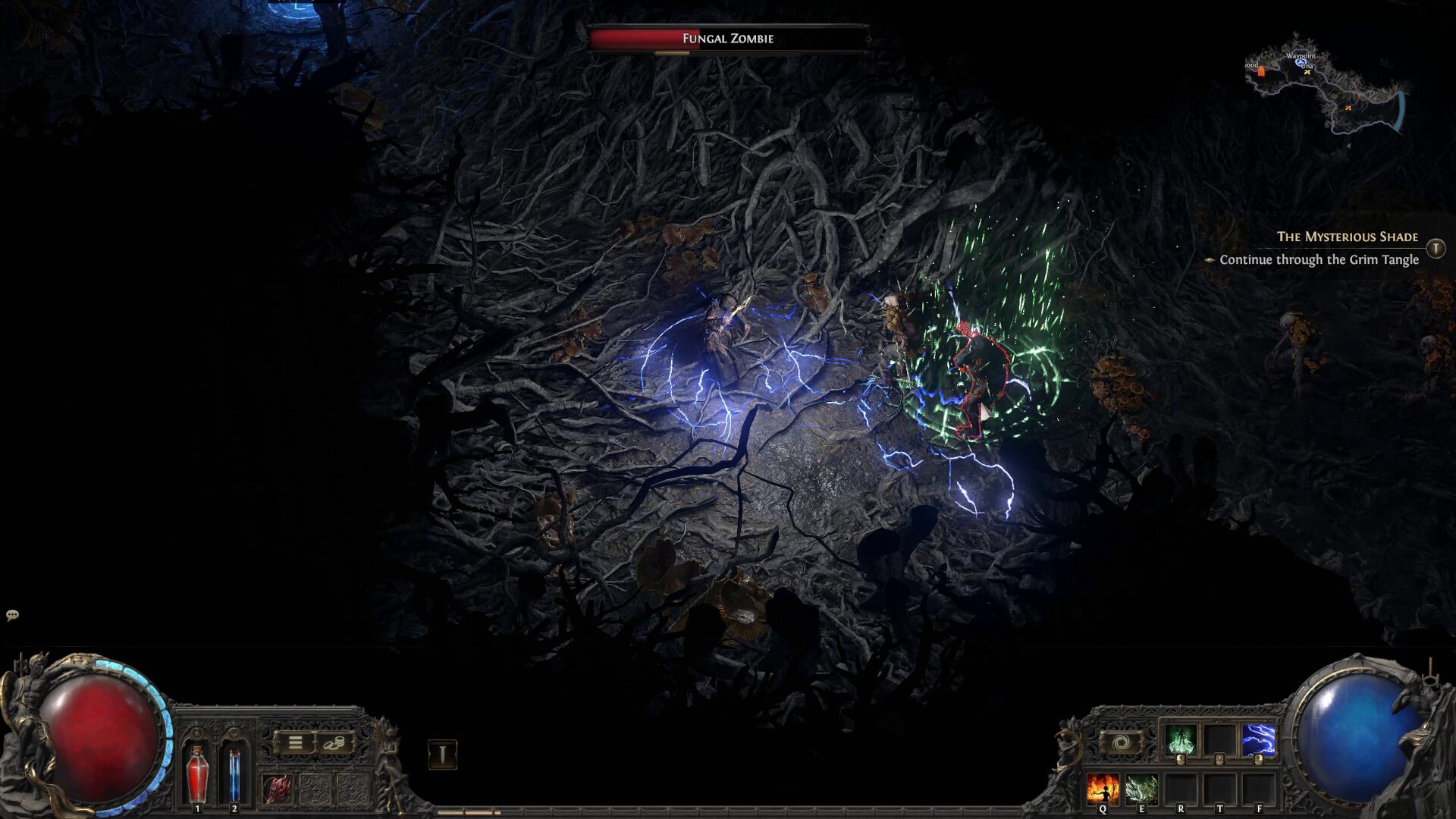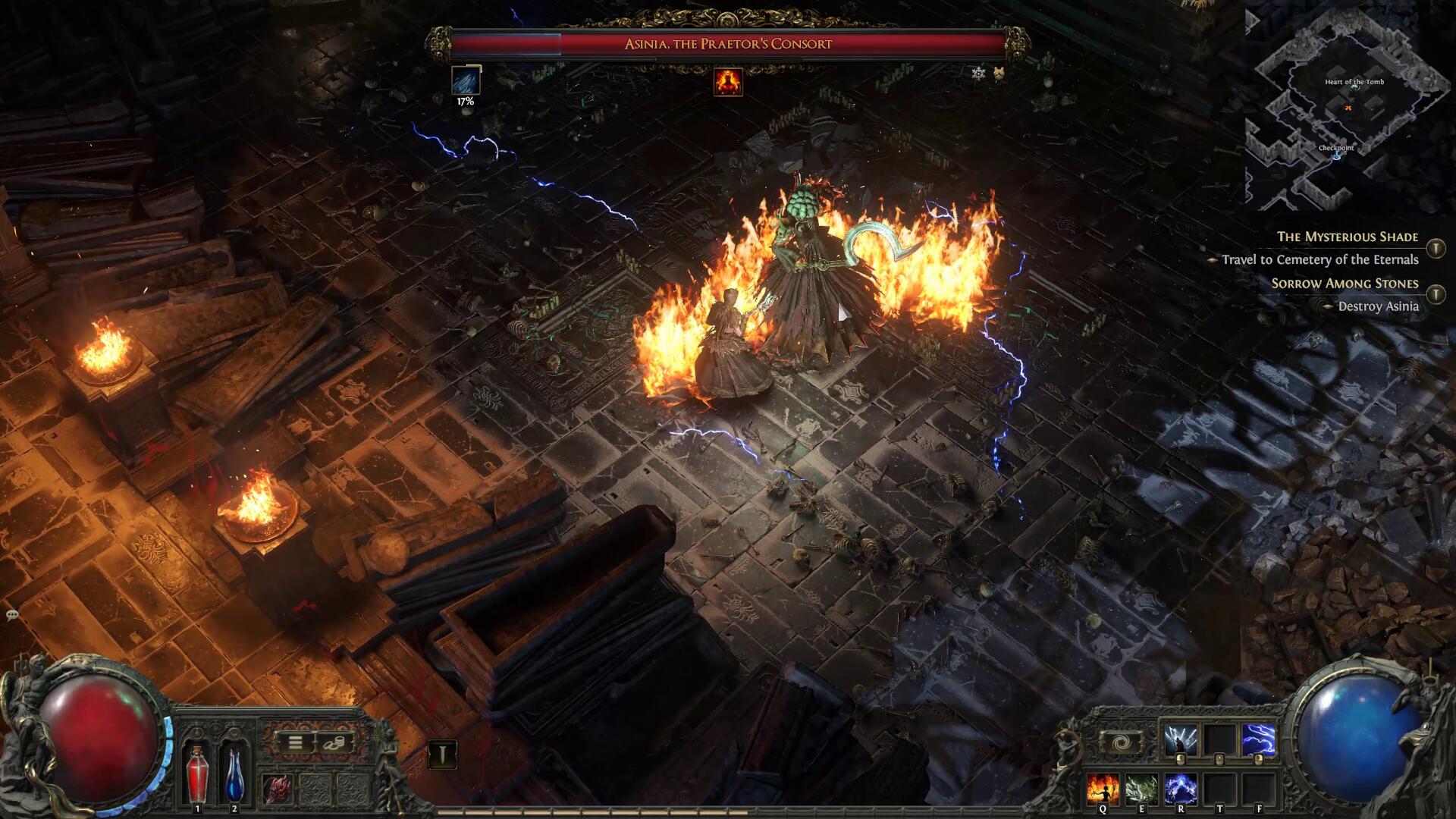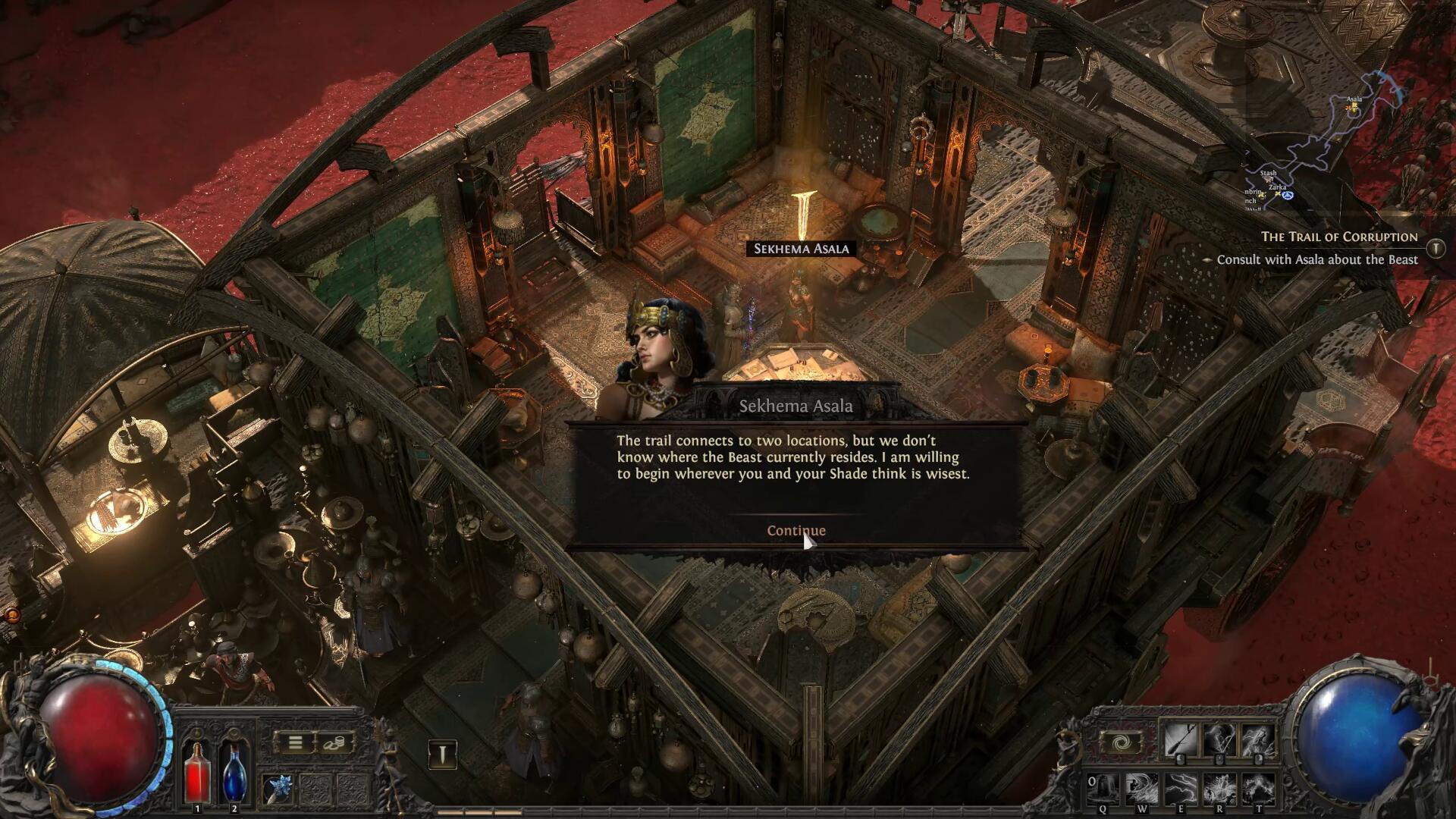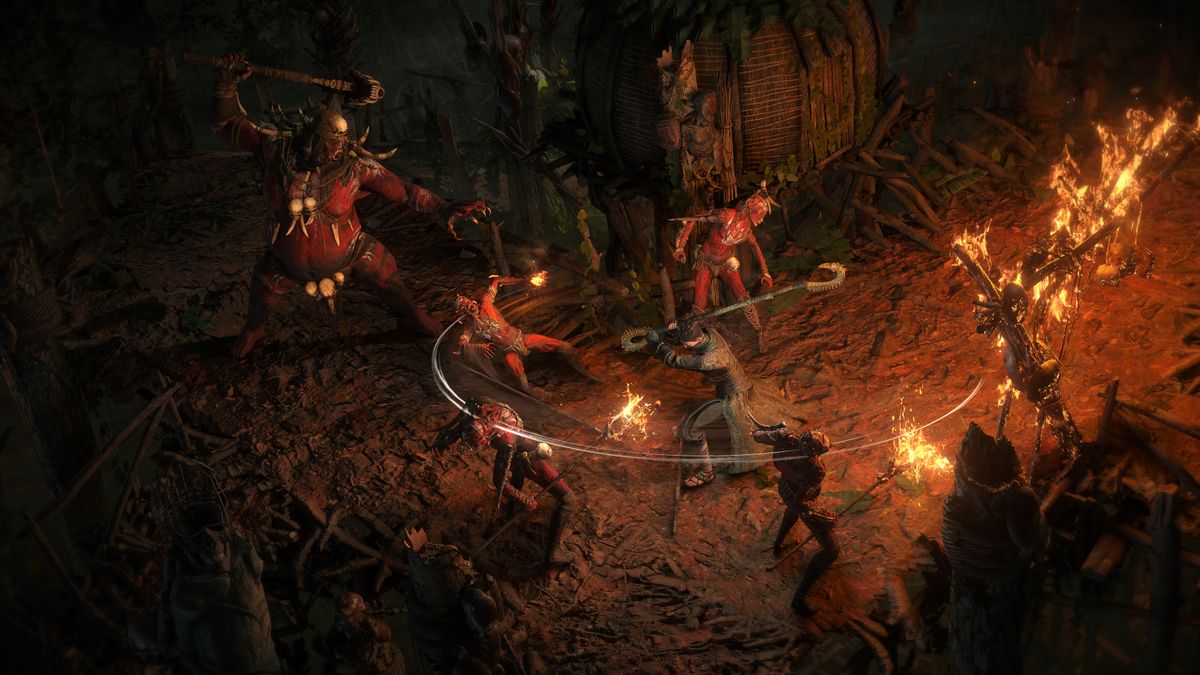With Path of Exile 2 out now in early access, developer Grinding Gear Games’ sequel is a fresh start for returning players and newcomers alike, but it’s also a doubling down of everything that made the original so compelling -– which will no doubt be a bit intimidating for many. After playing the first half of the campaign that the early access offers, evolving my monk and sorceress characters with an array of skill gems and passive abilities, Path of Exile 2 quickly proves itself to be a fantastic if brutal start to a larger action RPG adventure that has a promising future ahead. A dark fantasy Diablo-like, it quickly shows its more than its inspirations thanks to its demanding encounters and the sheer depth in build customization, though making the most of it is a learning curve all its own.
Path of Exile 2 picks up decades after the original, and things are still as bleak as ever within Wraeclast – made even worse by the spread of a malevolent force corrupting the living. Focusing on a new set of Exiles, your chosen character narrowly escapes execution and finds their way into the larger world where they’ll slay grotesque monsters, acquire new weapons and abilities, and stem the tide of the encroaching darkness across the lands.
The central conceit is largely standard fare for dark fantasy, and Path of Exile 2 sticks with the familiar tropes thus far. However, its depiction of the grim gives a strong aesthetic throughline across multiple gorgeous settings, whether they’re desert ruins, murky swamps, or horrific crypts housing undead specters. The storytelling remains light throughout, with opportunities to dig deeper with optional conversations with side characters, but what’s there helps establish the world’s identity, which shows promise for some more ambitious locales to come.
Finding your path in the darkness

Fast facts
Release date: November 6, 2024 (in Early Access)
Platform(s): PC, PS5, Xbox Series X
Developer: Grinding Gear Games
Publisher: Grinding Gear Games
Brutal is the best way to describe Path of Exile 2 – especially when it comes to combat and sense of challenge. Like Diablo 4, the core action sticks with an isometric view as you cut down enemies and pick up the spoils. However, there’s a heightened survivability aspect throughout, meaning you have to be especially mindful of enemy attack patterns and your evasive skills to make it through a fight. In that regard, it has that Dark Souls-like quality of not only learning the rules of engagement with enemies and boss patterns, but also dealing with the consequences of failure – loot not picked up upon death is lost for good, and enemies will return upon revival.
Getting into the flow and finding a loadout that worked for me was satisfying, and it’s a thrill to see a build come together and empower me to effortlessly demolish enemies in a dungeon by combining my skills. Though the core combat feels good when you’re ripping and tearing, at times I do feel it leans too far into that brutal and unforgiving approach. Even on the base difficulty, some encounters are currently overwhelming to the point of frustration, which can feel like sudden progression blocks. In some odd cases, the randomized encounters work against me after reviving at a checkpoint, immediately running into a pack of elite enemies with amped-up affixes that render me frozen and promptly stomped – yes, I got spawn camped in Path of Exile 2.
The sharp and hard to predict spikes in difficulty are a regular frustration for me, especially working through the end of Act II and going through Act III as a spongy but highly mobile Monk. But despite these moments of imbalance with the flow, I still find ways to punch through these encounters. One surprising tip: try using the alternative WASD control scheme, which plays similarly to a controller set up, as sacrilegious as it is to move away from the point-and-click movement for PC players. Given the game’s added focus on mobility, having that greater degree of control for character was essential for many encounters, which I grew to appreciate the more I got used to the rhythm of tougher exchanges.
The dark road ahead

The moment Path of Exile 2 clicked for me was when playing as a Monk, I decided to invest in a lightning magic skill from the Elemental group meant for the Sorceress. Wanting another AoE (area of effect) type skill to help deal wider damage, I made a habit of casting this alongside my other AoE, the Monk-specific Tempest Bell. Both augmented with enhanced duration, and working off one another with each pulse they helped me completely melt packs of enemies and even some bosses. At times, it felt game-breakingly effective. But, as I progressed the campaign, it lost its impact, forcing me to reconsider how to play my Monk, and meet a different kind of challenge.
Therein lies one of the things that makes the Path of Exile experience so fun to dive into – you can truly stretch the concept of what your class is and what they’re capable of. Along with the return of the now infamous passive skill tree, which you can spend hours examining to find the most potent path to invest in, you have new skill gems that can be applied to further augment the properties of abilities. I admire how much experimentation there is to be had, even if I don’t quite understand the true extent of its flexibility. The fact that the game lets you try something weird and get creative is something truly worthy of respect, and hints at a staggering level of depth for those willing to poke and prod at the best way to obliterate their foes.

“Even when I found myself frustrated with the difficulty or lost in how I should build my chosen classes, I still wanted to keep forging ahead.”
However, as much as I appreciate the sheer magnitude of the options on hand, I do wish the game would give some guidance, as it can be easy to lose sight of the bigger picture of where you would want your character to evolve. Aside from minor skill recommendations and the boilerplate options, it’s difficult for me to get a sense of if I was helping or hindering my character’s growth. I imagine that YouTube videos and best meta setup guides for classes will help, but given that I was playing the pre-release build, I had no such option and had to eyeball my approach – I think my Monk did pretty well all things considered, but those progression walls were often painful and frustrating.
Path of Exile 2 – even with only half the story campaign, half the roster, and a fraction of the endgame content in place – is a massive offering in early access. Even now, I’m impressed with the sheer amount of content packed in, and despite just playing two characters, it feels like there’s plenty more to learn to get the most out of how they play. I’m already looking forward to tackling more of the endgame offering, which allows for classes to evolve even further with ascendancies, and the returning Atlas world map filled with more activities.
Even when I found myself frustrated with the difficulty or lost in how I should build my chosen classes, I still wanted to keep forging ahead. Path of Exile 2 is in fantastic shape, and in a position to grow and change across its Early Access period. As an action RPG, it makes all the right moves, getting you in control of your character and ready to jump straight into the action. But it’s also a game that requires some dedication and patience to see it through. While that may be somewhat unapproachable for many, much like its predecessor, this follow-up is already off to a promising start for building up a dark fantasy that’s worth taking the plunge into.
Path of Exile 2 was reviewed on PC with access to a pre-release early access build provided by the publisher.
Looking to get stuck in with more demonic destruction? We’ve got a list of games like Diablo for you to tuck into!












Leave a Reply